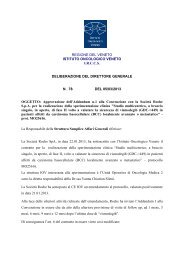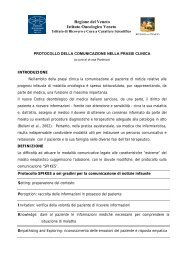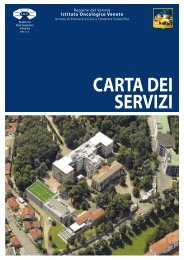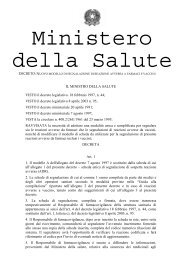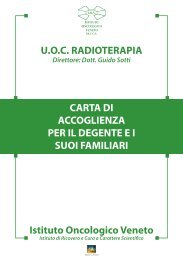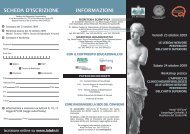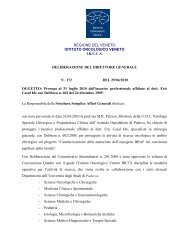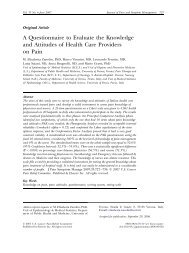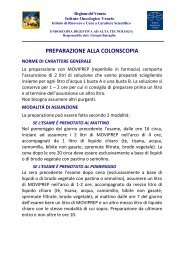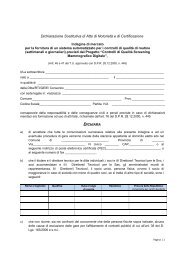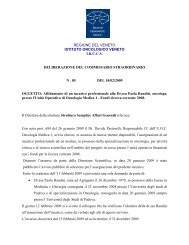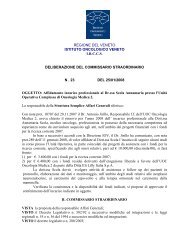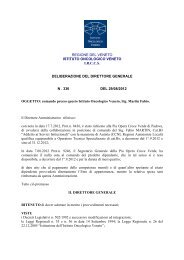SCIENTIFIC REPORT 2010 - 2011 - IOV
SCIENTIFIC REPORT 2010 - 2011 - IOV
SCIENTIFIC REPORT 2010 - 2011 - IOV
Create successful ePaper yourself
Turn your PDF publications into a flip-book with our unique Google optimized e-Paper software.
and experimental research. Several workers at <strong>IOV</strong> are now<br />
deeply involved in the treatment of this disease, aiming at buiding<br />
a multidisciplinary approach which has proven crucial for the<br />
progress of research in other more common cancers.<br />
a. CirCulaTiNG TumOr CEllS (CTC) iN paTiENTS TrEaTED wiTh<br />
firST-liNE SuNiTiNib<br />
CTC have a strong prognostic significange in breast,<br />
colorectal and prostate cancer, but their value in patients with<br />
advanced kidney cancer is sill poorly documented. A pilot study<br />
evaluating CTC counts in advanced RCC patients treated with<br />
first-line sunitinib has been carried out in cooperation with the<br />
Immunology and Molecular Oncology Unit of <strong>IOV</strong>, and other<br />
Oncological Units. More than 50 patients have been accrued so<br />
far, and about two thirds of them had one or more CTC in the<br />
blood. Total counts of CTC did not appear to correlate with the<br />
number of metastatic sites, and response or progression during<br />
sunitinib. However, when a count of apoptotic CTC was carried<br />
out, we found that an increase in these biologically inactive cells<br />
correlated with prolonged disease control. Based on these findings,<br />
we plan to extend the accrual to this study in order to prove the<br />
prognostic role of apoptotic CTC in advanced RCC.<br />
b. SuNiTiNib iN vON hippEl-liNDau SyNDrOmE<br />
Loss of function of the von Hippel-Lindau (VHL) gene located<br />
on chromosome 3 is the cause of this rare syndrome, but is also<br />
a key pathogenetic step in the development of sporadic clear cell<br />
RCC, with ensuing over-expression of VEGF-R, Platelet-Derived<br />
Growth Factor Receptor (PDGFR) and their ligands by the tumor<br />
and surrounding endothelial cells. In cooperation with the Unit<br />
for Hereditary Cancer of the <strong>IOV</strong> we started collecting data on<br />
VHL syndrome patients with advanced or recurrent RCC seen at<br />
our Institution. They were all treated with the TKI sunitinib as a<br />
first line regimen. Preliminary results have been presented at the<br />
ASCO Genitourinary Congress on February <strong>2011</strong>.<br />
C. SuNiTiNib iN ElDErly paTiENTS<br />
Since the activity and tolerability of sunitinib in unselected<br />
elderly patients ≥ 70 years are still poorly documented, we<br />
performed a retrospective analysis on feasibility and outcome<br />
of first or second-line sunitinib in 67 elderly patients with renal<br />
carcinoma followed in six oncological centers (<strong>IOV</strong>, Verona,<br />
Vicenza, Rovigo, Udine, Lucca). We found that dose reductions<br />
THE DEPARTMENTS - DEPARTMENT OF CLINICAL ONCOLOGY<br />
42<br />
(up-front or after a few cycles) are frequently needed, but median<br />
PFS of about 13 months compares favourably with published data,<br />
with only three cases of cardiotoxicity. Results were presented at<br />
the ECCO Conference in October 2009. In cooperation with<br />
IRST-Meldola we are currently conducting a larger analysis in<br />
elderly patients receiving sunitinib as a first-line treatment for<br />
advanced cancer.<br />
D. pharmaCOkiNETiCS Of Oral DruGS aND COrrElaTiON wiTh<br />
rESpONSE aND TOxiCiTy<br />
Both sunitinib and everolimus (an inhibitor of m-TOR<br />
complex) are administered at fixed oral doses with no modifications<br />
according to age or body surface. Yet, recent data show that<br />
plasma drug levels may be different among patients due to dose<br />
reductions and heterogeneity in pharmacokinetics (mainly due<br />
to polymorphisms of Cytochrome P450 family proteins and/or<br />
concomitant medications). Different blood concentrations may<br />
translate into different toxicity rates as well as reduced tumor<br />
control. In cooperation with the Pharmacology Unit of CRO-<br />
Aviano and IRST-Meldola we plan to conduct a study evaluating<br />
the blood levels of sunitinib and everolimus administered to<br />
young and elderly RCC patients. Our aims are to assess agerelated<br />
differences, to clarify situations of unexpected toxicity and<br />
to elaborate predictive models in which daily dose modifications<br />
of sunitinib and everolimus might be driven by pharmacogenomic<br />
polymorphisms (Cytochrome 3A4 or other proteins), actual<br />
blood concentrations of native drug and its active metabolites as<br />
well as co-administration of other drugs interfering with hepatic<br />
drug metabolism.<br />
E. CarDiOTOxiCiTy Of Oral Tki<br />
Since hypertension, decrease in Left Ventricular Ejection<br />
Fraction (LVEF), clinically symptomatic congestive heart failure,<br />
myocardial hyschemia and rhythm alterations have been described<br />
in patients treated with sunitinib and sorafenib, all patients<br />
with RCC treated at <strong>IOV</strong> undergo cardiologic monitoring in<br />
cooperation with the Cardiology Unit. Over the years 2006-<strong>2010</strong>,<br />
around 70 patients were followed with clinical examination,<br />
electrocardiogram and echocardiography performed at 4 to 6<br />
months intervals. Several cardiac events were registered, mainly<br />
grade 1 or 2 according to CTCAE and reversible after appropriate<br />
treatments, allowing the majority of patients to resume treatment.<br />
A retrospective evaluation of type, treatment and outcome of these



